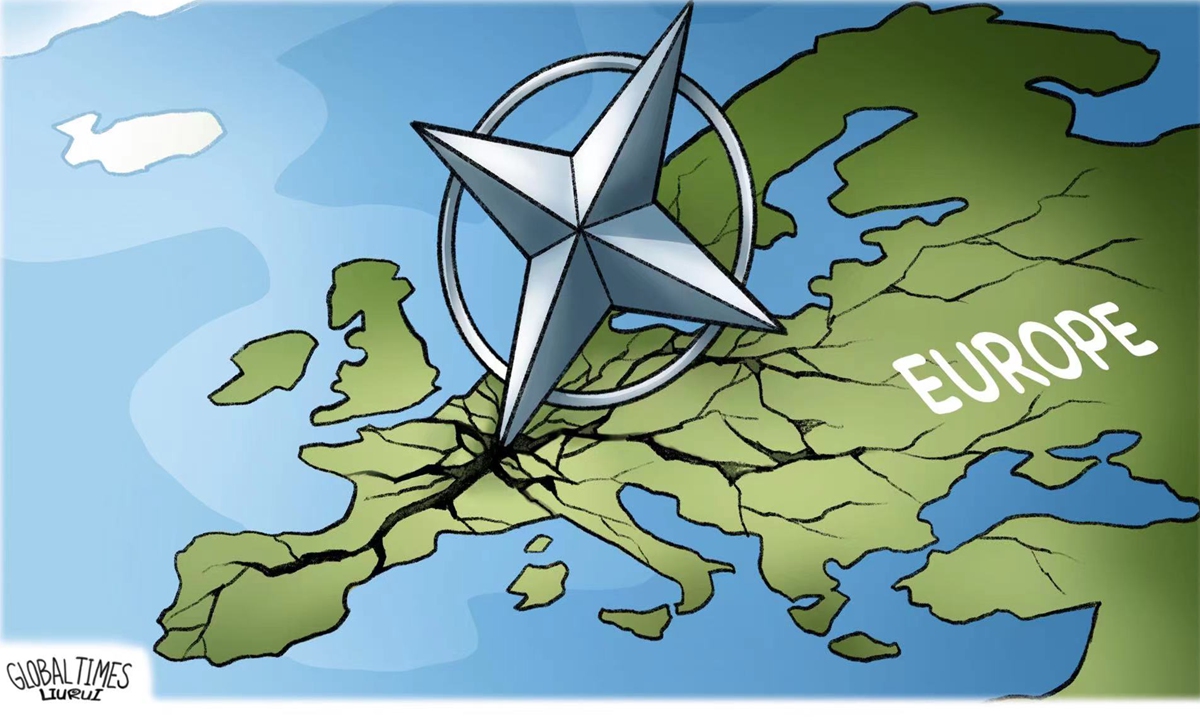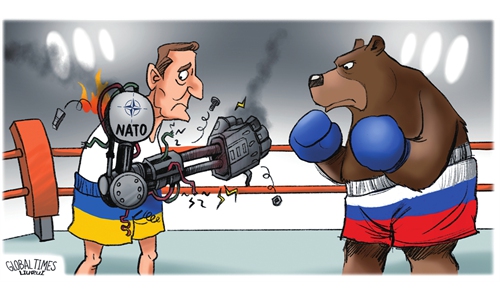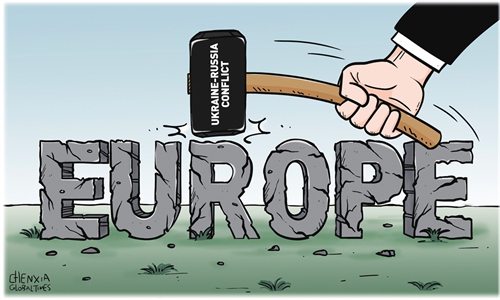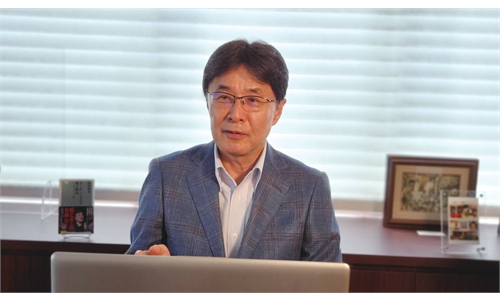
Europe deeply split on warmongering NATO Illustration: Liu Rui/GT
Editor's Note:NATO, which is constantly looking for imaginary enemies and justifying its existence by inciting confrontation, is about to hold a summit, and it also plans to extend its tentacles to the Asia-Pacific region. Behind its aggressive narrative, contradictions and divisions within NATO have become increasingly prominent. The Russia-Ukraine conflict is not going according to NATO's playbook. This series of articles will provide some clues regarding NATO's predicament. This is the third piece.
A recent poll from the Pew Research Center shows that 53 percent of the US right-wing has a favorable opinion of NATO, compared to 81 percent from the political left. Such a difference is the largest between the left and the right in the seven surveyed Western countries.
In general, US conservatives have a more negative attitude toward the transatlantic military alliance than the US as a whole - 67 percent of Americans view the organization positively. This has already been demonstrated amid the military conflict between Russia and Ukraine: Some Republican politicians rejected NATO, calling it "a relic of the Cold War," while some doubted if Washington's support for NATO should be unconditional.
The right's attitude toward the alliance reflects isolationism in the US resurges and intensifies, an ideology closely connected to populism to some extent. Both ideas advocate the country should use its resources to solve domestic problems. They also believe that the US should not involve too much in international affairs other than those on its continent - especially not in disputes among European nations. In terms of NATO, they share a deep skepticism about the value of the transatlantic alliance.
As Washington's strength is in relative decline and the US public feels more pessimistic about their standard of living, a confluence of populism and isolationism is inevitable.
In April, nearly a third of House Republicans voted against a resolution to reaffirm support for NATO and its principles. A Washington Post article later said this showed the Republican Party's "remarkable drift away" from NATO in recent years. "The isolationist posture of some Republicans is in line with the 'America First' ethos of Trump," it wrote.
Year 2016 was a critical point when isolationism was revived in the US. Former president Donald Trump adopted the "American First" slogan popular among US isolationists before World War II. Under this banner, Trump won a seemingly impossible victory in that year's presidential elections, with him becoming the most prominent icon of American isolationism and populism.
Calling NATO "obsolete" once, Trump was always a staunch "NATO skeptic" from the start. John Bolton, a national security adviser under Trump, confirmed in an interview in March that Trump "may well have withdrawn from NATO" if he had won a second term.
Trump's four years in office were chaotic and controversial, but his "America First" banner still has an impact on today's US political landscape. Arguably, such a doctrine is agreed by about 40 percent of the country's voters.
Many of the US right wing live in the country's relatively remote areas without having benefited much from globalization. They feel that the US has contributed more to the world's development than its own.
Theoretically, the concept of "American isolationism" originates from the Doctrine of Unstable Alliances that George Washington has advanced. This theory argues that since a nation's interests can change at any time in different situations, it is impossible to establish a lasting military alliance between countries; hence, all alliances will be temporary measures of convenience.
Today's US isolationists perhaps don't think as systematically as Washington did. They just make simple judgments based on their senses. They feel like the cost of alliances is enormous. They feel like the US cannot afford to invest more into alliances to give smaller countries "free rides." They feel like money should be spent on domestic affairs, especially on relatively poor and underdeveloped regions, rather than on allies.
At the societal level, the isolationists' anti-NATO discourse has shown growing influence in the US. It has also found an echo in the country's political elites. Last month, for example, the US Senate approved a $40 billion emergency military and humanitarian aid package for Ukraine, and all 11 no votes were from Republicans. Earlier, 57 Republicans voted against the bill in the House.
"NATO skeptics" in the US are exerting more pressure on the transatlantic relationship and weakening US leadership in NATO. NATO's "body" will continue to exist for a long time, but its "soul" has become elusive, with its cohesiveness and stability falling into a chronic decay.
In the face of the Ukraine crisis, the US and some European countries have imposed massive economic sanctions on Russia, aiming to destroy the Russian economy in one fell swoop. But as a result, these sanctions have disrupted the global supply chain of energy and other products and greatly exacerbated the already existing inflation in the US and some European countries. They are also posing a significant challenge to the livelihood of these countries' people. Under these circumstances, the differences between the US and Europe will become more evident.
In a more extreme scenario, will the US and its key allies in Europe fulfill their treaty commitments if the Russia-Ukraine conflict spilled over into a NATO member state? Obviously, Russia is already prepared for such a scenario, while NATO is not.
According to my observation, the Democrats are doomed to lose their majority in the House of Representatives in this year's midterm elections, while the results of the Senate elections are still unpredictable. Nevertheless, the emergence of more "grassroots" House Republicans underscores that isolationism has created more obstacles for the Biden administration, which is already in trouble.
With the US' unfavorable economic and political conditions and the growing doubts of European countries about US leadership, George Washington's "Doctrine of Unstable Alliances" will continue to haunt other NATO members like a huge specter.
The author is a research fellow at the Chinese Academy of Social Sciences. opinion@globaltimes.com.cn



